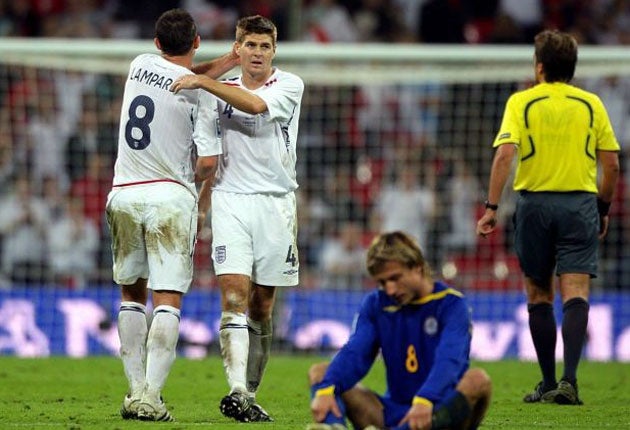Five reasons why Don Fabio's iron rule has turned England around
The secret to Capello's transformation of an underachieving side has been a strong hand, decisiveness and tactical self-assurance, writes Ian Herbert

Your support helps us to tell the story
From reproductive rights to climate change to Big Tech, The Independent is on the ground when the story is developing. Whether it's investigating the financials of Elon Musk's pro-Trump PAC or producing our latest documentary, 'The A Word', which shines a light on the American women fighting for reproductive rights, we know how important it is to parse out the facts from the messaging.
At such a critical moment in US history, we need reporters on the ground. Your donation allows us to keep sending journalists to speak to both sides of the story.
The Independent is trusted by Americans across the entire political spectrum. And unlike many other quality news outlets, we choose not to lock Americans out of our reporting and analysis with paywalls. We believe quality journalism should be available to everyone, paid for by those who can afford it.
Your support makes all the difference.1. Knowing how to play Lampard with Gerrard
Fabio Capello has had the intuitive grasp of both players' potential to deploy Lampard in the more defensive role and Gerrard the more offensive. But, as has been increasingly evident in the past few games, the England manager has enough trust in the professionalism of an individual like Lampard, and his feeling for the rhythms of a match, to know that there will be times when the Chelsea player wants to operate outside of the system and surge forward. England's left-side problem no longer exists because Capello has effectively abolished it in his new designation for Gerrard. The Liverpool man occasionally operates in front of Ashley Cole and when the opportunity arrives he heads off inside and Wayne Rooney will switch with him. Flexibility within a system: that is what Capello has delivered. As Lampard said yesterday: "It's just about timing and it's working very well."
2. Making big decisions
The defining one came in September last year when, perhaps tempted to deploy David Beckham on the right in Zagreb against England's nemesis, Croatia, Capello opted for Theo Walcott instead. The hat-trick he scored that night destroyed Slaven Bilic's side and was the decisive moment of the qualifying campaign. Sometimes, the eye-catching decisions are the easiest. It can take a stronger individual to call back someone from the wilderness, and risk ridicule, than to send him there. Capello proved that in bringing back Beckham when at Real Madrid and in sticking with him for England now. He may be getting on but Beckham has a talismanic quality in the camp.
Where individuals have been ignored, there has been logic to it. Michael Owen, the fourth-highest scorer in history for England, has not been in Capello's plans, even when Carlton Cole and Emile Heskey withdrew after March's game against Slovakia, because his form has not warranted it. Another big decision.
3. Discipline
The obvious one. No takeaway meals, sometimes no mobile phones, good timekeeping, taking breakfast together, keeping to the playing system agreed in training and, as he put it so early into his regime, instilling "the advantages of a Mediterranean diet over ketchup and chips." Suddenly a player's drive to The Grove hotel in Hertfordshire is one with a hint of healthy anxiety attached. The players have acceded to Capello's demands because leadership instils confidence and this has been a key to a qualifying tournament which reached its apotheosis on Wednesday. Confidence is everything in Capello's England because his players trust him and he has taught them to trust themselves. Never mind conjecture, regard what Capello's jubilant players said yesterday. "When you have confidence you play even better," – Aaron Lennon. "We're confident now," – Lampard. "Everyone's confident and positive," – Jermain Defoe. And at the heart of all that is his discipline.
4. Understanding Wayne Rooney
Rooney has delivered Capello's side to South Africa in such spectacular style but this hasn't happened by osmosis. While Sven Goran Eriksson and Steve McClaren generally left Rooney to it, Capello has been an assiduous observer of the player in training. He, more even than Sir Alex Ferguson at Old Trafford, has stopped Rooney exerting needless energy by marauding all over the pitch and has told him to be be more selfish. Rooney assumes better goalscoring positions now and interplays better with others. Observe how the Manchester United striker discussed his pursuit of a record World Cup qualifying goalscoring tally of 10 yesterday: "There are two games left. I'm sure the manager will take me through different things and parts of the games," he said. That's Capello – always on his shoulder, nurturing and cajoling the man on whom next summer depends.
5. Having five emerging players
It has not all been down to the manager. Individual performances during the campaign have demonstrated quite how much has been thrown away in the past four years. To the regalvanised presence of Lampard and Gerrard there has been added the consistency of Gareth Barry, on the fringes of a regular place when Capello arrived, but now someone who offers the defensive shield which has permitted Lampard to go forward. Walcott was a boy when Eriksson took him to Germany in 2006 but he has come of age as an international in the qualifying campaign and so, on Wednesday night, did Aaron Lennon. No one could doubt's Eriksson's judgement in not naming Defoe in his final squad three years ago but he is a prime contender for South Africa. Neither is it without good reason that Capello raves about Glen Johnson, who has nine months to develop a defensive game to match his attacking play.
Join our commenting forum
Join thought-provoking conversations, follow other Independent readers and see their replies
Comments